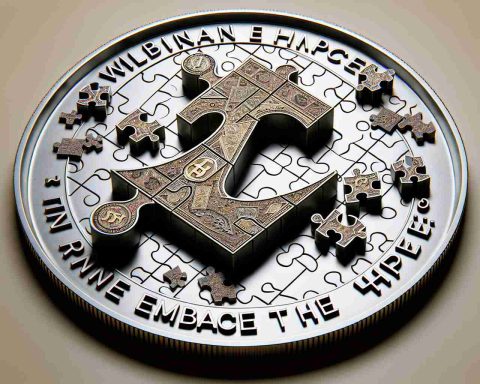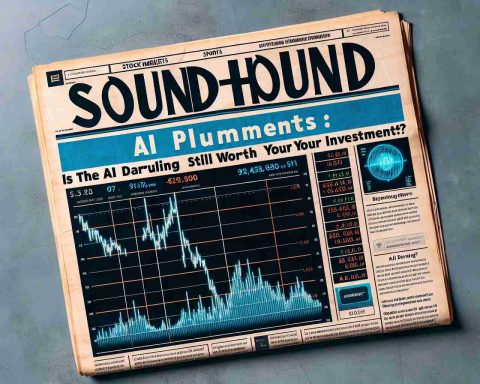- Ripple’s XRP is gaining prominence in cross-border transactions, leveraging blockchain technology to transform global money movement.
- XRP offers faster transaction processing and lower fees compared to Bitcoin and Ethereum, benefiting businesses seeking efficiency and cost-saving measures.
- Strategic partnerships with banks and financial institutions are expanding XRP’s network, enhancing liquidity and bridging traditional and digital banking systems.
- The Ripple-SEC legal battle may shape future U.S. digital currency regulations, influencing XRP’s adoption within regulated financial frameworks.
- XRP’s integration with emerging technologies like central bank digital currencies could bolster its role in the digital financial landscape.
In an era dominated by digital transformation, Ripple’s XRP continues to carve a unique niche in the financial sector, particularly within cross-border transactions. Recent developments in blockchain technology have positioned XRP as a potential game-changer, promising to revolutionize how money moves across the globe.
XRP’s Speed and Efficiency have always been its strong suits. Unlike Bitcoin and Ethereum, Ripple’s cryptocurrency boasts significantly faster transaction processing times and lower fees. Its ability to settle international transactions in seconds is a boon for businesses seeking efficiency and cost-saving measures in global operations.
New Partnerships on the Horizon are further fueling XRP’s potential. Ripple has been actively expanding its network by forming strategic alliances with banks and financial institutions worldwide. These partnerships aim to enhance liquidity and provide seamless transaction solutions, bridging the gap between traditional banking systems and the digital asset space.
Regulatory Clarity Ahead? The ongoing legal battle between Ripple and the U.S. Securities and Exchange Commission (SEC) has brought XRP into the spotlight. The outcome could set a precedent for how digital currencies are regulated in the United States, potentially paving the way for broader adoption of XRP within regulated financial frameworks.
Looking forward, XRP’s Integration with New Technologies such as central bank digital currencies (CBDCs) could play a crucial role. By leveraging Ripple’s blockchain technology, CBDCs might achieve enhanced efficiency and interoperability, further positioning XRP as a cornerstone of the digital financial future.
XRP: The Future of Cross-Border Transactions?
Market Forecasts: XRP’s Growth Trajectory
Ripple’s XRP is poised for significant growth in the financial sector. Analysts predict an increasing adoption rate due to its fast transaction speeds and affordability. As the need for efficient cross-border solutions intensifies, Ripple’s strategic partnerships with banks and financial institutions globally are cementing its role. By 2025, the market size for cross-border transactions is expected to multiply, and XRP could see a substantial uptick in use, impacting its market value positively.
Innovations: XRP’s Role in Emerging Markets
Emerging markets stand to benefit significantly from XRP’s technology. With a large portion of the population in these regions underserved by traditional banking systems, Ripple’s solutions offer an affordable and accessible way to partake in global finances. Innovations like microtransactions, enabled by Ripple’s low transaction costs, could revolutionize commerce in these areas, fostering economic growth and inclusion.
Security Aspects: Mitigating Risks with XRP
Security in digital transactions remains a concern, but XRP offers robust solutions. Ripple’s consensus algorithm ensures transaction integrity without the energy-intensive processes seen in other cryptocurrencies like Bitcoin. Additionally, new updates in Ripple’s blockchain technology are enhancing security measures, offering encrypted and secure cross-border transactions. This security improvement may lead to increased trust and adoption among users.
Top Questions and Answers
1. How does XRP compare to Bitcoin for international transactions?
XRP significantly outperforms Bitcoin in terms of transaction speed and cost. While Bitcoin transactions can take up to an hour to settle with relatively high fees, XRP transactions generally finalize within seconds at a fraction of the cost. This efficiency makes XRP more advantageous for real-time international transactions.
2. What are the implications of Ripple’s legal challenges with the SEC?
The legal battle between Ripple and the SEC is crucial as it could determine the regulatory landscape for digital currencies in the U.S. A favorable outcome for Ripple may lead to regulatory clarity, encouraging broader adoption of XRP within traditional financial systems and potentially driving up its value and use.
3. How might XRP benefit from integration with central bank digital currencies (CBDCs)?
XRP’s integration with CBDCs could enhance the efficiency and interoperability of these emerging digital currencies. Ripple’s blockchain technology provides a ready infrastructure for seamless integration, offering central banks a tested, scalable solution to implement their digital currency initiatives.
For further insights into XRP and Ripple, visit the official Ripple website: Ripple.


















